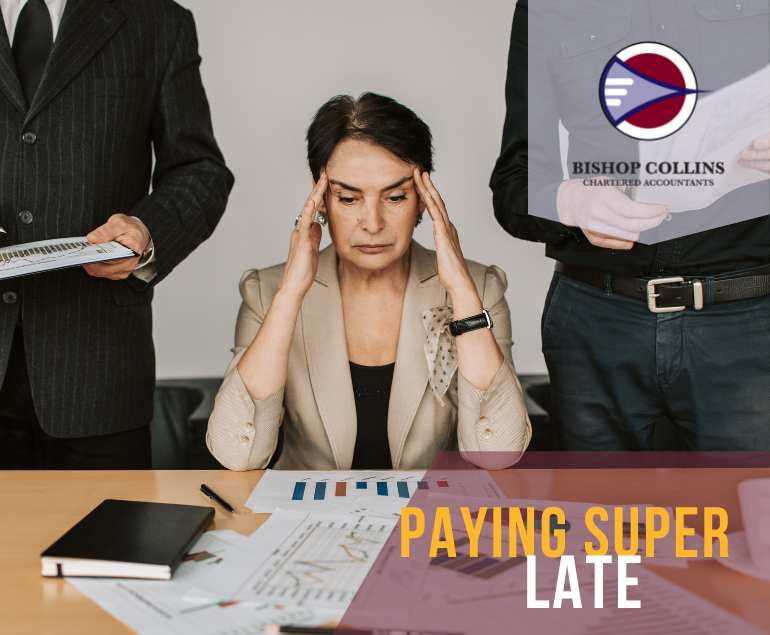Every business has cash flow problems from time to time and often they find themselves paying some of their bills a bit late. When it comes to an employee contribution, Super is one of those payments that can creep up on you and easily be treated like any other creditor. This is a big mistake!
The purpose of this article is to urge businesses to prioritise their employee’s super contributions above any other debt, and to follow superannuation rules for employers. For those who are happy to just follow instructions, there is no need to read on; however, if you don’t already feel compelled to comply or simply want to know why then keep reading!
 What Should I Do If I Pay Super Late?
What Should I Do If I Pay Super Late?
If a business owner pays their super late they are officially obligated to lodge a form with the ATO called a Super Guarantee Statement. A SG statement:
- Is due for lodgement one month after the super was due to be paid
- Tells the ATO how much super you paid late (or haven’t paid),
- Back dates and charges interest at 10% from the beginning of the late quarter
- Adds $20 per employee for ATO administration fee.
You also lose your tax deduction on any of the payments toward this liability.
The ATO then chases you for this debt and you get this added to your ATO account as a Super Guarantee Charge (SGC) liability. You now need to pay them directly and they will then pass the interest and the late super on to the employee’s super fund.
There is another charge called ‘Part 7 Penalty’. This is a snake in the grass which can really bite you if you are not careful so I will talk about this later in the article.
 What Used to Happen If I Paid Super Late?
What Used to Happen If I Paid Super Late?
Historically if businesses paid their super late, their employees, and the ATO, would not necessarily pick up that the payments were late. Afterall, super statements only come once per year and so long as they see some contributions going into their fund, both the ATO and the employee would not generally investigate further.
At this time there were still very hefty penalties for paying super late and you were still obligated to lodge a SG statement. If you didn’t bother lodging a SG statement and were just a few days late in paying then late payments were usually only picked up in an ATO audit. An ATO audit often occurred when no super was paid in a full financial year or from an employee complaint to the ATO.
The ATO rarely applied any additional penalty other than the interest and administration fee but superannuation rules for employers have now changed significantly.
What Happens Now If I Pay Super Late?
Technology and government oversight of business has ramped up significantly in the last few years. Specifically, the ATO has introduced…(cue the theme music)…‘SuperStream’, which is an electronic payment and information system that communicates when the business pays into the super account of an employee. This system loops in the fund and the ATO with identifying data to allow them to track exactly when super is being paid. It also includes how much, what period the super is for, who paid, the type of contribution and basically everything they need to know to enforce their very heavy handed legislation and apply subsequent penalties.
Superannuation rules for employers now mean that if you pay super late, the ATO will know that you have paid late (through ’SuperStream’). Presently they are being courteous with first time offenders and rather than just slapping you with an audit, they will often notify you in a warning letter that you have made a late payment and that you may want to lodge your SG statement. If you get one of these letters please respond immediately by lodging your SG statement.
 An Example of How Late Super Payments Work
An Example of How Late Super Payments Work
Your 31 December 2022 quarterly employee super contribution is due on the 28th January. Let’s assume it is $10,000 and your tax rate is 25% (just to make the numbers easy)
- Scenario 1: You pay this on-time and receive a deduction for the super contribution, so out of your gross earnings it would cost you $10,000 less a tax deduction of say 25% so $7,500 (that’s the easy, and preferred, scenario)
Now let’s look at what happens if you process an employee’s super contribution late and it hits the employee super account on the 29th January – only 1 day late. Sounds like no big deal, but according to the ATO it is, so here’s what could happen:
- Scenario 2: You are now officially obligated to lodge a form with the ATO called an SGC statement. This back dates interest at 10% to the beginning of the quarter (in this case 1st October) and adds $20 per employee for ATO administration. Most Importantly, you lose your tax deduction plus Interest and admin here is minimum $383.33, so you have to earn enough to pay your 25% tax on top ($10,383/(1-25%) = $13,844) . The result of paying 1 day late has cost you almost double the cost of paying on time at $13,844
All of the above are the existing rules and are meant to be followed by businesses. The problem is that most of the time businesses are just paying the super late and hoping that the ATO don’t notice (obviously not recommended) since they already know through ‘SuperStream’.
So, let’s look at the ATO practice statement in action:
- Scenario 3: You didn’t lodge the SG statement with the ATO and time has now passed (say 12 months for the ATO to follow up here). You receive a letter from the ATO requesting further information about the quarter ending 31st December 2022. After swearing to yourself and contacting your accountant (who doesn’t like to swear but does anyway) you lodge the SG statement BUT NOW, the ATO issues you with a Part 7 Penalty (insert evil music). Now you’ve paid your $10,000 (now +interest +admin costs after 12 months would be approximately $1500) and the ATO add on top of this $23,000 ($11,500 @ 200%) and once again because this is not tax deductible it costs you $34,500 / (1-25%) = $46,000
That’s over 4.5 times the original cost (and only gets worse as time passes with interest and with more employees)
So, for a $10,000 super expense:
- Scenario 1: on-time = $10,000
- Scenario 2: lodge SGC if late = $13,844
- Scenario 3: don’t lodge SGC and pay late = $46,000
Please don’t let this happen to you!
Ensure Payments Reach the Employee Super Fund by the Due Date!
Another trap is that the ATO takes the payment from when it reaches your employees super fund account which can be tricky when using a clearing house that takes a few days to process the payment.
If your payment is paid on the 28th January for example, this will be classified as a late payment if the super has not reached your employees superfund by the 28th and therefore you are meant to lodge a Super Guarantee statement (SGC) with the ATO within one month of the due date.
One way to ensure employee contributions are made on time is to pay them frequently. Why not pay at the same time as each pay run? For example, with Xero clearing house, you can process your super as often as you like and by doing this regularly you reduce the risk of falling into the trap of late super penalties. It also helps with cash flow to avoid a big lump of super once per quarter.
If we assist with your bookkeeping and pay-runs we send payment authorisations more regularly so don’t hesitate in acting on these payments, process them immediately.
If you need help with ensuring your super obligations are met or wish to discuss the above with us please do not hesitate to contact us and book an appointment. At Bishop Collins our friendly expert team is always ready to help!





 What Should I Do If I Pay Super Late?
What Should I Do If I Pay Super Late? What Used to Happen If I Paid Super Late?
What Used to Happen If I Paid Super Late? An Example of How Late Super Payments Work
An Example of How Late Super Payments Work